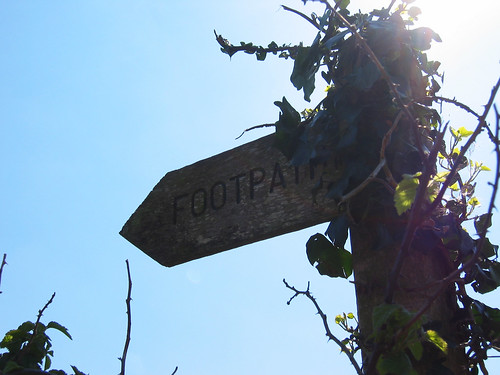
{Photo by rocketlass.}
In her biography of Thomas Hardy, Claire Tomalin writes, "[Hardy] could . . . use his sense of the world's random cruelty to make a masterpiece." I have just begun reading Tess of the d'Urbervilles (1891) for the first time since the spring of 1994, when I was turning twenty. Last year's visit to Hardy's native Dorset, where rocketlass (whom I'd not met when last I read the novel) and I traced the young Hardy's steps through the heath from Higher Bockhampton to the market town of Dorchester, has given me exactly the sort of additional context that can make re-reading so powerful; fourteen years of living have done their part as well.
Mere pages in, I am captivated. Memories of the whole rush in upon me with sufficient force that I can already agree with Tomalin:
To read Tess is an emotional experience; to write it must have been an overwhelming one. . . . [Hardy] was exact when he said a novel is not an argument but an impression, and this novel lives through its impressions of Tess and the landscapes through which she moves.And here are the first of those impressions:
A young member of the band turned her head at the exclamation. She was a fine and handsome girl--not handsomer than some others, possibly--but her mobile peony mouth and large innocent eyes added eloquence to colour and shape. She wore a red ribbon in her hair, and was the only one of the white company who could boast of such a pronounced adornment. . . . Tess Durbeyfield at this time of her life was a mere vessel of emotion untinctured by experience. The dialect was on her tongue to some extent, despite the village school. . . . Phases of her childhood lurked in her aspect still. As she walked along to-day, for all her bouncing handsome womanliness, you could sometimes see her twelfth year in her cheeks, or her ninth sparkling from her eyes; and even her fifth would flit over the curves of her mouth now and then.T. S. Eliot wrote of Hardy,
Yet few knew, and still fewer considered this. A small minority, mainly strangers, would look long at her in casually passing by, and grow momentarily fascinated by her freshness, and wonder if they would ever see her again: but to almost everybody she was a fine and picturesque country girl, and no more.
What again and again introduces a note of falsity into Hardy's novels is that he will leave nothing to nature, but will always be giving one last turn of the screw himself, and of his motives for so doing I have the gravest suspicion.That's true of Jude the Obscure (1895), which eventually turns so grimly gothic as to be laughable, but in Tess we feel the workings of true, implacable fate, abetted (or even goaded) by the inherent cruelties of society. Hardy himself provocatively wrote in his explanatory note to the first edition,
I would ask that any too genteel reader, who cannot endure to have said what everybody nowadays thinks and feels, to remember a well-worn sentence of St Jerome's: If an offence come out of the truth, better is it that the offence come than that the truth be concealed.
Never read it. But I'm really keen to. What fascinates me is how Hardy ties events to their landscape. I wonder if there's a sense in which the moral wrongs perpetrated on his characters are caused by the collapse of the moral economy of the countryside -- the destruction of an older, better way of life by the forces of industry.
ReplyDeleteI've just had the pleasure of re-reading Tess.
ReplyDeleteI still want to slap Angel Clare on the wedding day!